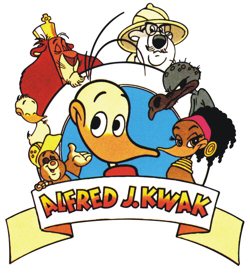Drakestail
Drakestail (French: Bout-d'-Canard, lit. Duck Butt), also known as Quackling[1] or Drakesbill[2], is a French wikipedia:fairy tale about a duck who confronts a king to get the money back he was promised, originally written by wikipedia:Charles Marelle. This story was adapted by Herman van Veen into the original 1976 Alfred J Kwak theater play.
Summary
Drakestail is a fable about a frugal duck who saves a hundred gold coins. The king borrows the money from Drakestail, promising to repay him. After three years without any word from the king, Drakestail decides to visit the king to reclaim his debt.
On his journey, Drakestail meets four companions: a fox, a ladder, a river, and a bees' nest. Each asks to accompany him, and he agrees[notes 1].
Upon reaching the castle, Drakestail and his companions are thrown into the poultry-yard, where chickens and turkeys attack him. The fox intervenes and kills them. Drakestail is then cast into a well, but the ladder rescues him. When he is subsequently thrown into a furnace, the river extinguishes it and saves him.
Finally, the king attempts to sit on Drakestail, but the bees emerge and sting the king to death[notes 2]. Drakestail searches for his money, only to discover that the king has spent it all. The people of the country find Drakestail resting on the throne and crown him king.
History
The original version of this story, Bout-d'-Canard, was written by Charles Marelle in 1888, translated into English in Red Fairy Book by Andrew Lang in 1890. Other notable translations/adaptions were in 1920 by Edgar Shimer into Drakesbill and his friends', published in the compilation Fairy stories my children love best of all, and the picture book Quackling: A Not-Too-Grimm Fairy Tale by Aaron Shepard in 2018.
==
Comparisons to the 1976 theater play
French: Quand, quand, quand! me rendrez-vous mon bel argent? (lit. When! When! When! Will you give me back my beautiful money?)
English[notes 3]: Quack! Quack! Quack! When shall I get my money back?
Dutch: Kwek, Kwek, Kwek! Ik ben wel goed, maar ik ben niet gek. (lit. Quack, quack, quack! I am definitely good, but I'm not crazy.)
Notes
- ↑ Various versions of the tale would phrase it differently, and some have Drakestail offering the ride instead of merely agreeing to it.
- ↑ In other versions the king uses a sword to threaten Drakestail. The king doesn't always die from the bee stings, but instead just runs away never to be seen.
- ↑ Translated into English by Wikipedia:Andrew Lang in 1890.
References
- ↑ Shepard, Aaron. Quackling: A Not-Too-Grimm Fairy Tale. Ontario: Shepherd's Pub. 2018.Template:Cite journal}}
- ↑ Shimer, Edgar Dubs. Fairy stories my children love best of all. New York: L. A. Noble. 1920. pp. 89-101.Template:Cite journal}}
